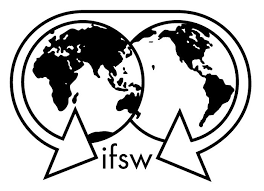Social pedagogy is based on humanistic values and is primarily concerned with well-being, learning and growth and seeks to recognise and promote each individual’s potential. In part one of this two part blog, UCLan’s Ali Gardner explored the concept in the context of social work leadership.
In part two, she explains how this methodology can support social workers in navigating the occasionally contentious nature of accountability to both employers and the individuals and families whom they serve…
Pedagogy in practice
Social workers frequently speak of the fundamental principles guiding their practice but admit to becoming distracted by some of the bureaucratic, process driven factors involved in their work.
Principles, we know, are easy to profess but much harder to practice. An engagement with social pedagogy with its deep philosophical and theoretical roots can support professionals to take care of their intentions, words, thoughts and beliefs and align them with their underpinning values. Leading one’s work from a human rights perspective in this way demonstrates a central tenet of social work leadership, ethical leadership.
Ethical leadership challenges practitioners to reflect on the level of congruence between our values and our action. It is within this process of reflection that social workers can hope to balance their legal, organisational and professional accountabilities, as required in the Knowledge and Skills Statement.
Social workers should be able to demonstrate the principles of social work through professional judgement, decision making and actions within a framework of professional accountability. They should be able to work collaboratively to manage effectively the sometimes competing interests…
To do this, social workers must see themselves not only as employees but as professionals practicing under a protected title. At times this may present a sense of being pulled in opposing directions presenting the greatest challenge in leading from a human rights perspective.

Social pedagogy and power
Central to social pedagogy is the aim of sharing power wherever possible in relationships with individuals and their families and colleagues within organisations. From a social pedagogical perspective, leadership is about supporting others to empower themselves. In order to do this, the focus becomes drawing out the potential of others.
Social workers often talk of empowerment as a desired goal for individuals they work alongside but don’t necessarily see connections with the role of leadership or view themselves as leaders in this process.
Furthermore, attempts to reject paternalistic notions of welfare support have led many practitioners to distance themselves from notions of leadership, fearing its connection with oppressive regimes in which those in charge have prevented individuals from exercising agency in their own lives.
So maybe we need to re-brand leadership. Instead of seeing it as something only managers do and being fundamentally connected with an imbalance of power, we need to engage with social pedagogical notions of leaderships.
 The good news is that such an approach aligns with the international definition of social work in which notions of empowerment and liberation of people are central to the profession. Furthermore, social workers are called to enable individuals to develop their full potential, enriching their lives….
The good news is that such an approach aligns with the international definition of social work in which notions of empowerment and liberation of people are central to the profession. Furthermore, social workers are called to enable individuals to develop their full potential, enriching their lives….
So, we return to the question of how might social pedagogy support the development of leadership in social work? It is clear that the humanistic principles of social pedagogy are familiar to those working in the profession.
In this sense, social pedagogy does not provide a new set of ideas or require a radical change in the way we view the task of social work. It does however challenge practitioners to think about how they carry out their role and the tasks attached to this role.
Social pedagogy offers a clear and uncompromising value driven starting point. As described in part one of this blog, this is referred to as Haltung and provides the ethical orientation for all action.
It does not prescribe a set of rules or defer to policy for approval. Instead it requires practitioners to engage with integrity, deep respect, compassion and sensitivity in their work in balancing competing priorities in a participatory and accountable manner.
The engagement with one’s head, heart and hand enables social workers to develop the confidence and competence to make professional judgements in each situation, depending on a multitude of factors.
Social work requires individuals who can lead their own practice in this way and support others to so the same, thus promoting social work’s purpose, practices and impact as required in the PCF.

1 comment
Comment by Colin Slasberg posted on
Its great than Lyn is giving a platform for Ali to set out the importance of social workers having the right mindset – of which social pedagogy is clearly one powerful source – to enable them to work with ‘real ethical literacy’. Practice that measures up to social work’s code of ethics will deliver the ‘creative, purposeful and collaborative’ work required to ‘design support that enhances wellbeing’. This is far removed from ‘working from a deficit model in which the professional knows best’ which currently prevails.
Ali is also surely right to make the equally important point that social workers must show leadership if change is to happen. But what should social workers actually do?
It cannot be the case that ‘passion and compassion’ will suffice. This assumes that social workers are responsible for the current state of affairs and have simply chosen to work in oppressive ways. The reality is that it is impossible for practitioners to work as Ali describes when the system they work within demands that ‘need’ can only be recognised if there is resource to meet it with everything else swept under the carpet; when the local resource allocation process standardises ‘need’ to create a controllable flow of demand; and which demands demonstration of deficit, risk and crisis to attract resources.
These are the hallmarks of what the Local Government Association has recently dubbed the ‘eligibility driven approach’ which the LGA says must be brought to an end if the vision of the Care Act is to be realised(https://futureofadultsocialcare.co.uk/wp-content/uploads/2018/11/29.13-Green-paper-full_web.pdf). The LGA is surely right.
It can be no answer to simply focus on practice at the margins of the mainstream where the eligibility process doesn’t come into play, such as all Wellbeing teams or ‘strengths based practice’ at the front door. These are worthy innovations, but do nothing to change what happens when people have to enter the mainstream system to secure public resource.
For social workers to rally to Ali’s call for leadership they must become agents of change. Front line practitioners working as a body would be powerful advocates for an end to the oppressive and depersonalising ‘eligibility driven approach’. But social workers in leadership roles are in even more powerful positions. They must stop the current vogue of pumping up the volume of the rhetoric of the personalisation agenda as if practitioners – and, indeed, councils - can simply choose to change the way they practice. They should instead be turning their full attention to exploring and then advocating for the practical options for real and sustainable changes so that the ‘eligibility driven approach’ that makes ‘ethically literate’ practice impossible is left behind for good.